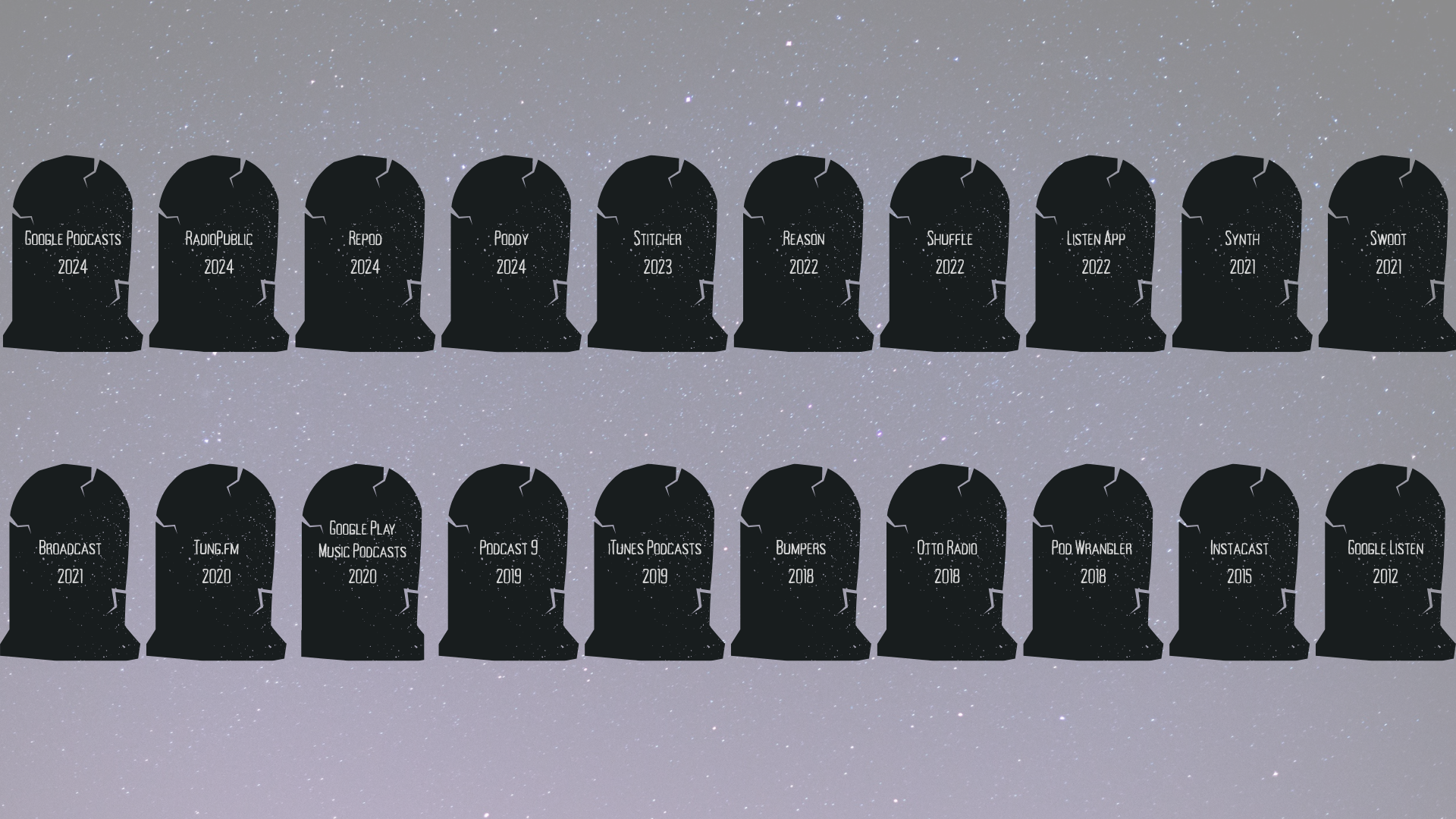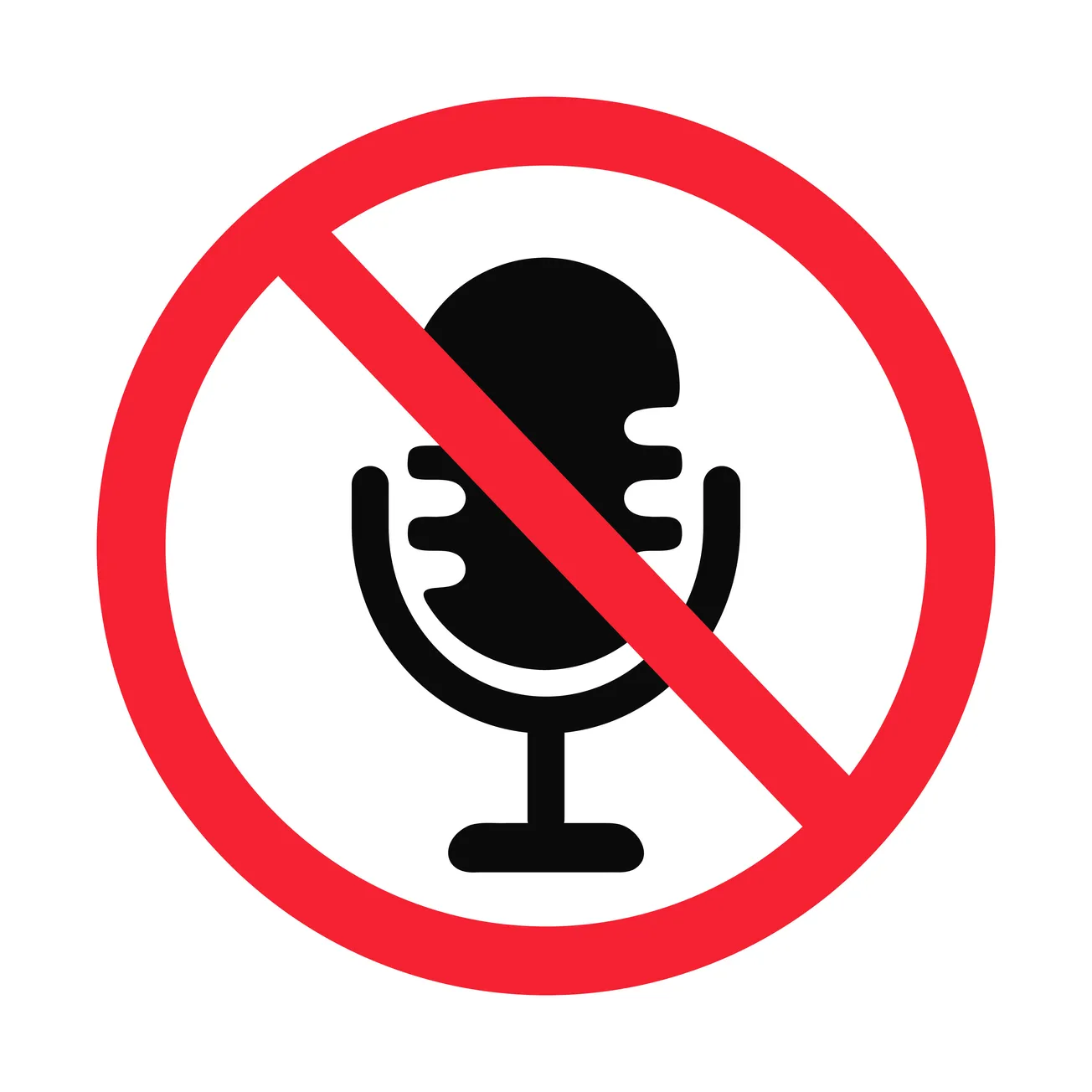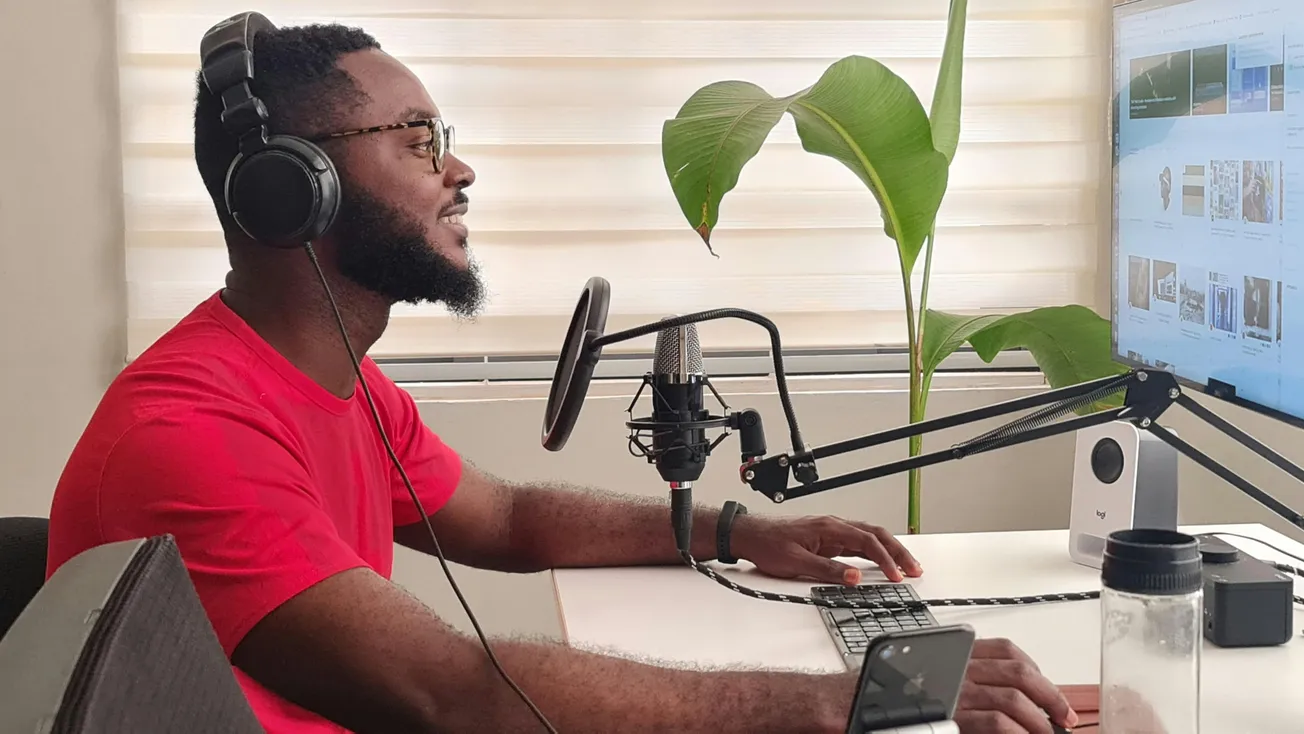Dozens of podcast apps once aimed to reshape how listeners discovered and consumed audio. From social podcast platforms to apps backed by major tech companies, these tools promised innovation, but many have since disappeared.
Step through the gates of the podcast app graveyard and look back at discontinued apps like Google Podcasts, Stitcher and RadioPublic, and the reasons behind their demise.
Whether it was monetization struggles, low user engagement or market saturation, each app faced the challenges of surviving in the competitive podcast app market. In this article, we explore why these failed podcast apps could not keep up and what their collective downfall says about the future of podcast listening apps.

Google Podcasts (2024)
- Reason for Shutdown: Google discontinued Google Podcasts April 2024, shifting its focus to YouTube Music. This strategic move aimed to consolidate audio content under a single platform.
- What It Means: Signals a pivot toward bundling podcasts with broader media ecosystems like YouTube Music – less about pure podcasting and more about multi-format content.
RadioPublic (2024)
- Background: Launched as a platform to enhance podcast discoverability and provide revenue opportunities for podcasters.
- Reason for Shutdown: Acquired by Acast in 2021, RadioPublic was eventually shut down in 2024 as part of Acast's consolidation efforts.
- What It Means: Represents the trend in which smaller innovation-driven platforms get absorbed by larger monetization-focused networks.
Repod (2024)
- Background: A social podcast player that allowed users to comment and discuss episodes.
- Reason for Shutdown: The app went offline in 2024, likely due to challenges in sustaining user engagement and differentiating itself in a crowded market.
- What It Means: Underscores the difficulty of sustaining podcast-focused social platforms; engagement does not necessarily convert into growth or revenue.
Poddy (2024)
- Background: Introduced in 2023 as a social podcasting app.
- Reason for Shutdown: Discontinued by 2024, possibly due to limited adoption and competition from established platforms.
- What It Means: Even with outstanding social or AI features, visibility and user retention remain steep challenges.
Stitcher (2023)
- Background: One of the longest-running podcast apps, launched in 2008, known for streaming audio without manual syncing.
- Reason for Shutdown: SiriusXM acquired Stitcher and shut down the app August 2023 to focus on integrating podcasts into its primary subscription service.
- What It Means: Its absorption into SiriusXM shows how podcast brands are increasingly being folded into subscription bundles.
Reason (2022)
- Background: A Techstars-funded social podcasting app that featured tagging, commenting and friend activity tracking.
- Reason for Shutdown: Shut down in 2022, likely due to difficulties in scaling and monetizing the social podcasting model.
- What It Means: Another casualty of the “social audio” trend, proving that podcast discovery via comments, shares or in-app conversations is not an enticing behavior for most users.
Shuffle (2022)
- Background: Launched in 2020 with a TikTok-like interface for podcast clips.
- Reason for Shutdown: Went offline in 2022, possibly due to challenges in user acquisition and retention.
- What It Means: The TikTok-for-podcasts model did not scale well, highlighting how audio does not work well with the viral, bite-sized formats that drive video-first social platforms.
Listen App (2022)
- Background: Started in 2019 and underwent several iterations, including live podcasting features during the pandemic. Emphasized creator-fan interaction and live podcasting.
- Reason for Shutdown: Discontinued in 2022, potentially due to market saturation and limited differentiation.
- What It Means: Its closure signals the challenges of building creator ecosystems outside of YouTube or Patreon-style infrastructures.
Synth (2021)
- Background: Marketed as a podcast app for purposeful listening, offering short sound bites.
- Reason for Shutdown: Went offline in 2021, likely due to niche appeal and limited user base.
- What It Means: Its failure suggests that users prefer full episodes or highlight reels curated by hosts rather than apps.
Swoot (2021)
- Background: Aimed to make podcast listening social by showing what friends were listening to. It tried to bring friend graphs into listening behavior.
- Reason for Shutdown: Shut down in 2021, possibly due to challenges in user engagement and competition.
- What It Means: The shutdown reaffirms that podcasting remains a personal, solitary experience for most.
Broadcast (2021)
- Background: Another social podcast discovery app.
- Reason for Shutdown: Website turned off in 2021, indicating discontinuation, likely due to market competition. Similar to Swoot, failed to turn podcasting into a viral social graph.
- What It Means: Suggests a repeated pattern: people do not "follow" podcasts like they do social media posts.
Tung.fm (2020)
- Background: A social podcast player launched in 2016, allowing recommendations and discussions.
- Reason for Shutdown: Disappeared from app stores around 2020; the creator moved on to other projects.
- What It Means: Its demise highlights how few early entrants had the tech or capital to build sustainable audiences.
Google Play Music Podcasts (2020)
- Background: Introduced podcast support in 2016. Tried early on to make podcasting social and interactive.
- Reason for Shutdown: Shut down in October 2020 as Google transitioned users to Google Podcasts and YouTube Music.
- What It Means: Demonstrates how even tech giants can cannibalize their own projects. Its closure cleared the way for YouTube Music to eventually become the default Google podcast solution.
Podcast 9 (2019)
- Background: Launched in 2019 with features like episode previews and transcript bookmarks.
- Reason for Shutdown: Never relaunched after initial beta; still listed as "in beta" on the App Store.
- What It Means: Reinforces the importance of pitching complete, stable products in a noisy market.
iTunes (2019)
- Background: Apple added podcasts to iTunes in 2005.
- Reason for Shutdown: Replaced by separate apps (Apple Music, Apple TV and Apple Podcasts) in October 2019; iTunes continued on Windows until February 2024.
- What It Means: Marked a major strategic pivot by Apple, removing podcasts from desktop software and embracing mobile podcasting (via Apple Podcasts).
Bumpers (2018)
- Background: A social listening app allowing creation and sharing of short audio clips.
- Reason for Shutdown: Shut down in 2018, likely due to competition and limited user adoption.
- What It Means: Its failure emphasized that podcast creation tools need depth, not just virality.
Otto Radio (2018)
- Background: Focused on news and podcasts.
- Reason for Shutdown: Transitioned to audiobooks under the brand Hibooks in 2018.
- What It Means: Represents a broader trend of companies chasing more predictable consumer revenue models.
Pod Wrangler (2018)
- Background: A podcast client for iOS launched in 2013.
- Reason for Shutdown: Last referenced in 2018; likely discontinued due to lack of updates and competition.
- What It Means: Shows how indie-built apps often struggle to keep up with rapidly changing platform expectations (UX, monetization, sync, etc.).
Instacast (2015)
- Background: An iOS and Mac podcast app.
- Reason for Shutdown: Ended in June 2015 due to lack of funds; later open-sourced in 2018.
- What It Means: One of the earliest signs that building and maintaining a podcast app without a business model is unsustainable.
Google Listen (2012)
- Background: Launched in 2009 as a Google Labs experiment for Android.
- Reason for Shutdown: Discontinued in 2012, possibly due to limited adoption and strategic shifts.
- What It Means: Its death foreshadowed a decade-long uncertainty toward podcasting before YouTube stepped in.
Common Factors Leading to Shutdowns
Many podcast apps failed due to a combination of market saturation and weak monetization models. With so many platforms competing for attention, even well-designed newcomers struggled to stand out against big names like Spotify and Apple Podcasts.
Many of these apps also lacked sustainable business models, offering free services without clear paths to revenue.
Many apps were lost to strategic shifts within larger companies, like Google combining audio under YouTube Music. Social podcasting features, while innovative, did not consider that most users treat podcasts as a solitary experience, not a social one. Without a strong community, these apps quietly disappeared.






